Hospitality Consumer Behaviour and Insight
VerifiedAdded on 2023/06/06
|13
|3834
|493
AI Summary
This report analyzes the factors influencing consumer behavior in the hospitality industry, including cultural, social, personal, and psychological factors. It explores the impact of digital technology on consumer trends and decision-making processes. The report also compares and contrasts the differences in the decision-making process between B2B and B2C. Additionally, it evaluates different approaches to market research and methods of research used for understanding decision-making processes. Finally, the report discusses how marketers can influence the decision-making process.
Contribute Materials
Your contribution can guide someone’s learning journey. Share your
documents today.
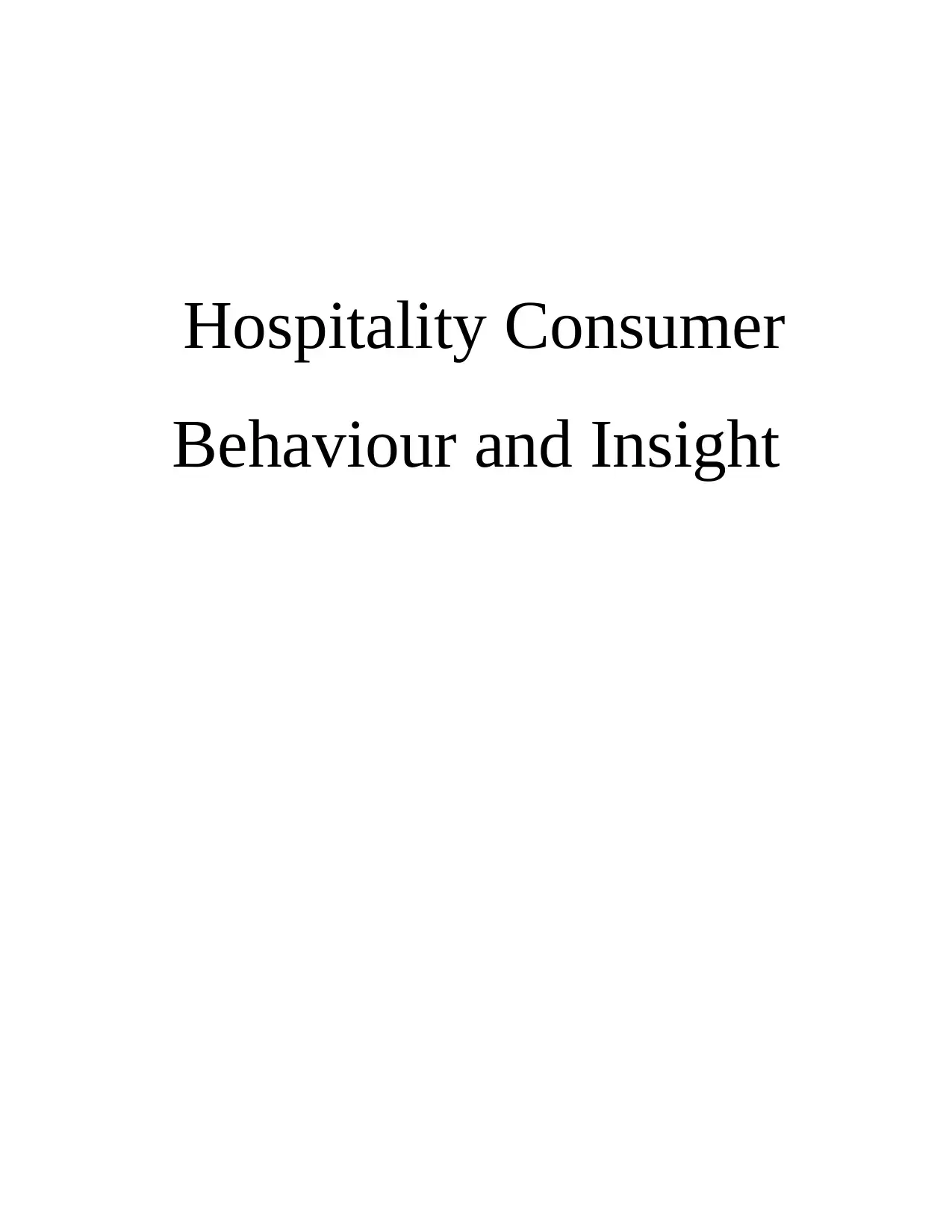
Hospitality Consumer
Behaviour and Insight
Behaviour and Insight
Secure Best Marks with AI Grader
Need help grading? Try our AI Grader for instant feedback on your assignments.
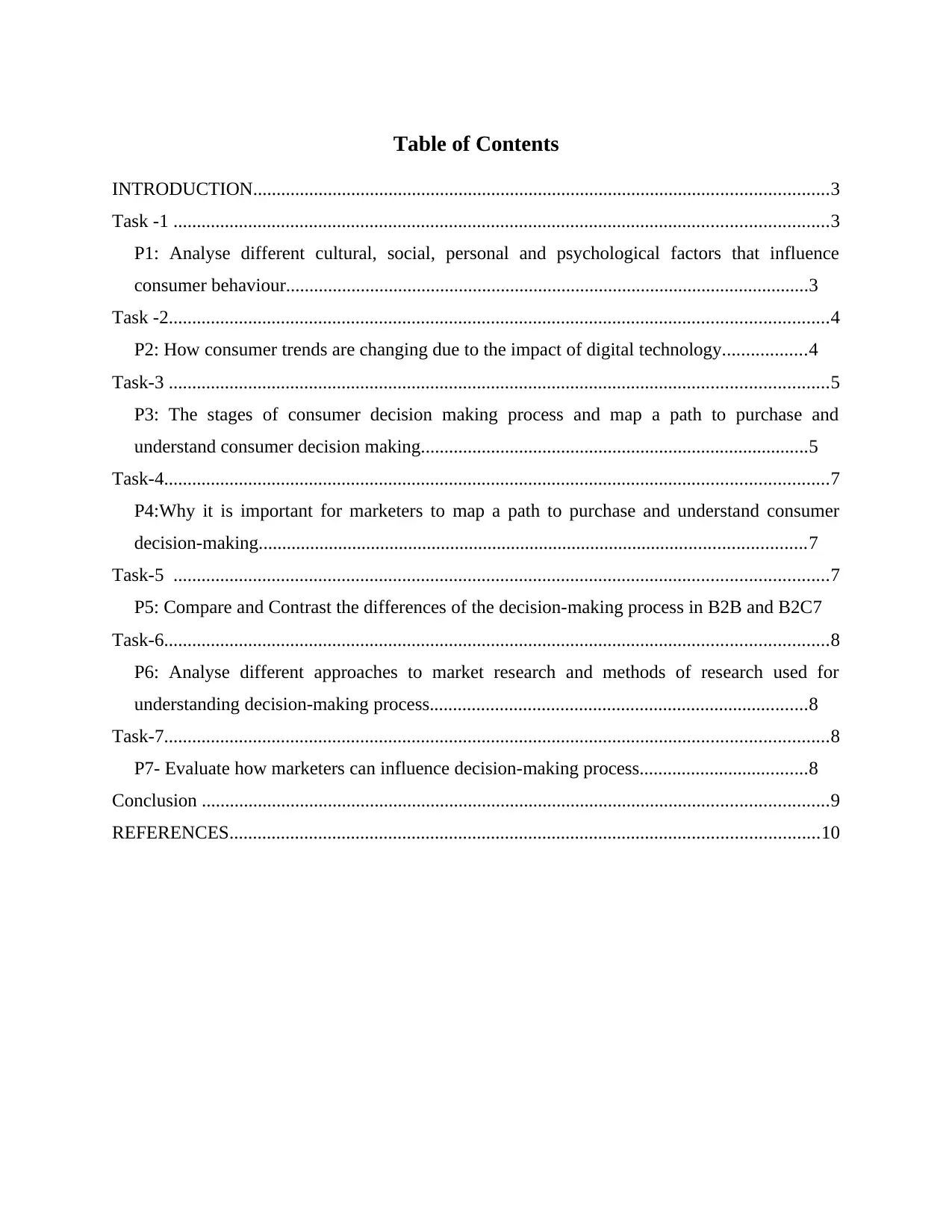
Table of Contents
INTRODUCTION...........................................................................................................................3
Task -1 ............................................................................................................................................3
P1: Analyse different cultural, social, personal and psychological factors that influence
consumer behaviour................................................................................................................3
Task -2.............................................................................................................................................4
P2: How consumer trends are changing due to the impact of digital technology..................4
Task-3 .............................................................................................................................................5
P3: The stages of consumer decision making process and map a path to purchase and
understand consumer decision making...................................................................................5
Task-4..............................................................................................................................................7
P4:Why it is important for marketers to map a path to purchase and understand consumer
decision-making.....................................................................................................................7
Task-5 ............................................................................................................................................7
P5: Compare and Contrast the differences of the decision-making process in B2B and B2C7
Task-6..............................................................................................................................................8
P6: Analyse different approaches to market research and methods of research used for
understanding decision-making process.................................................................................8
Task-7..............................................................................................................................................8
P7- Evaluate how marketers can influence decision-making process....................................8
Conclusion ......................................................................................................................................9
REFERENCES..............................................................................................................................10
INTRODUCTION...........................................................................................................................3
Task -1 ............................................................................................................................................3
P1: Analyse different cultural, social, personal and psychological factors that influence
consumer behaviour................................................................................................................3
Task -2.............................................................................................................................................4
P2: How consumer trends are changing due to the impact of digital technology..................4
Task-3 .............................................................................................................................................5
P3: The stages of consumer decision making process and map a path to purchase and
understand consumer decision making...................................................................................5
Task-4..............................................................................................................................................7
P4:Why it is important for marketers to map a path to purchase and understand consumer
decision-making.....................................................................................................................7
Task-5 ............................................................................................................................................7
P5: Compare and Contrast the differences of the decision-making process in B2B and B2C7
Task-6..............................................................................................................................................8
P6: Analyse different approaches to market research and methods of research used for
understanding decision-making process.................................................................................8
Task-7..............................................................................................................................................8
P7- Evaluate how marketers can influence decision-making process....................................8
Conclusion ......................................................................................................................................9
REFERENCES..............................................................................................................................10
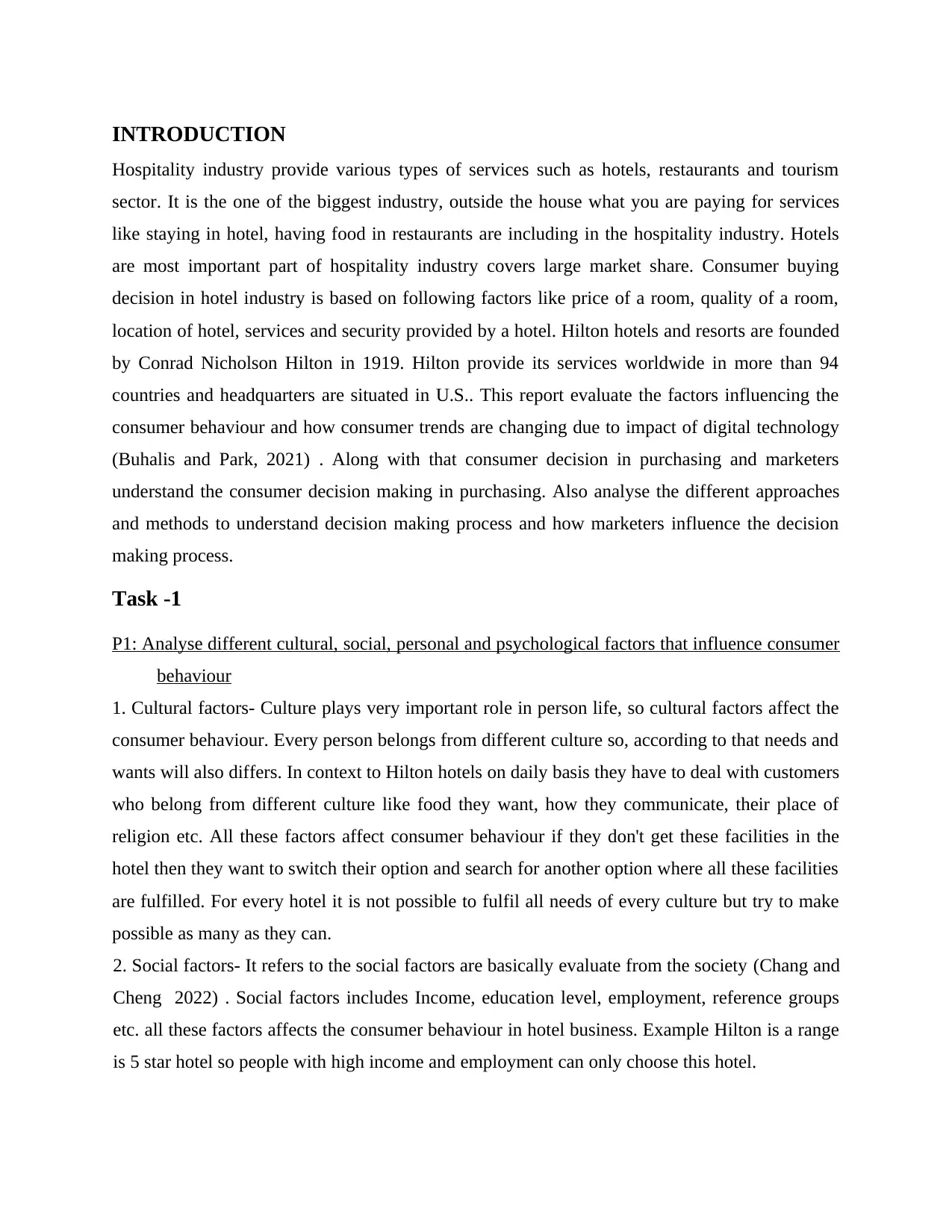
INTRODUCTION
Hospitality industry provide various types of services such as hotels, restaurants and tourism
sector. It is the one of the biggest industry, outside the house what you are paying for services
like staying in hotel, having food in restaurants are including in the hospitality industry. Hotels
are most important part of hospitality industry covers large market share. Consumer buying
decision in hotel industry is based on following factors like price of a room, quality of a room,
location of hotel, services and security provided by a hotel. Hilton hotels and resorts are founded
by Conrad Nicholson Hilton in 1919. Hilton provide its services worldwide in more than 94
countries and headquarters are situated in U.S.. This report evaluate the factors influencing the
consumer behaviour and how consumer trends are changing due to impact of digital technology
(Buhalis and Park, 2021) . Along with that consumer decision in purchasing and marketers
understand the consumer decision making in purchasing. Also analyse the different approaches
and methods to understand decision making process and how marketers influence the decision
making process.
Task -1
P1: Analyse different cultural, social, personal and psychological factors that influence consumer
behaviour
1. Cultural factors- Culture plays very important role in person life, so cultural factors affect the
consumer behaviour. Every person belongs from different culture so, according to that needs and
wants will also differs. In context to Hilton hotels on daily basis they have to deal with customers
who belong from different culture like food they want, how they communicate, their place of
religion etc. All these factors affect consumer behaviour if they don't get these facilities in the
hotel then they want to switch their option and search for another option where all these facilities
are fulfilled. For every hotel it is not possible to fulfil all needs of every culture but try to make
possible as many as they can.
2. Social factors- It refers to the social factors are basically evaluate from the society (Chang and
Cheng 2022) . Social factors includes Income, education level, employment, reference groups
etc. all these factors affects the consumer behaviour in hotel business. Example Hilton is a range
is 5 star hotel so people with high income and employment can only choose this hotel.
Hospitality industry provide various types of services such as hotels, restaurants and tourism
sector. It is the one of the biggest industry, outside the house what you are paying for services
like staying in hotel, having food in restaurants are including in the hospitality industry. Hotels
are most important part of hospitality industry covers large market share. Consumer buying
decision in hotel industry is based on following factors like price of a room, quality of a room,
location of hotel, services and security provided by a hotel. Hilton hotels and resorts are founded
by Conrad Nicholson Hilton in 1919. Hilton provide its services worldwide in more than 94
countries and headquarters are situated in U.S.. This report evaluate the factors influencing the
consumer behaviour and how consumer trends are changing due to impact of digital technology
(Buhalis and Park, 2021) . Along with that consumer decision in purchasing and marketers
understand the consumer decision making in purchasing. Also analyse the different approaches
and methods to understand decision making process and how marketers influence the decision
making process.
Task -1
P1: Analyse different cultural, social, personal and psychological factors that influence consumer
behaviour
1. Cultural factors- Culture plays very important role in person life, so cultural factors affect the
consumer behaviour. Every person belongs from different culture so, according to that needs and
wants will also differs. In context to Hilton hotels on daily basis they have to deal with customers
who belong from different culture like food they want, how they communicate, their place of
religion etc. All these factors affect consumer behaviour if they don't get these facilities in the
hotel then they want to switch their option and search for another option where all these facilities
are fulfilled. For every hotel it is not possible to fulfil all needs of every culture but try to make
possible as many as they can.
2. Social factors- It refers to the social factors are basically evaluate from the society (Chang and
Cheng 2022) . Social factors includes Income, education level, employment, reference groups
etc. all these factors affects the consumer behaviour in hotel business. Example Hilton is a range
is 5 star hotel so people with high income and employment can only choose this hotel.
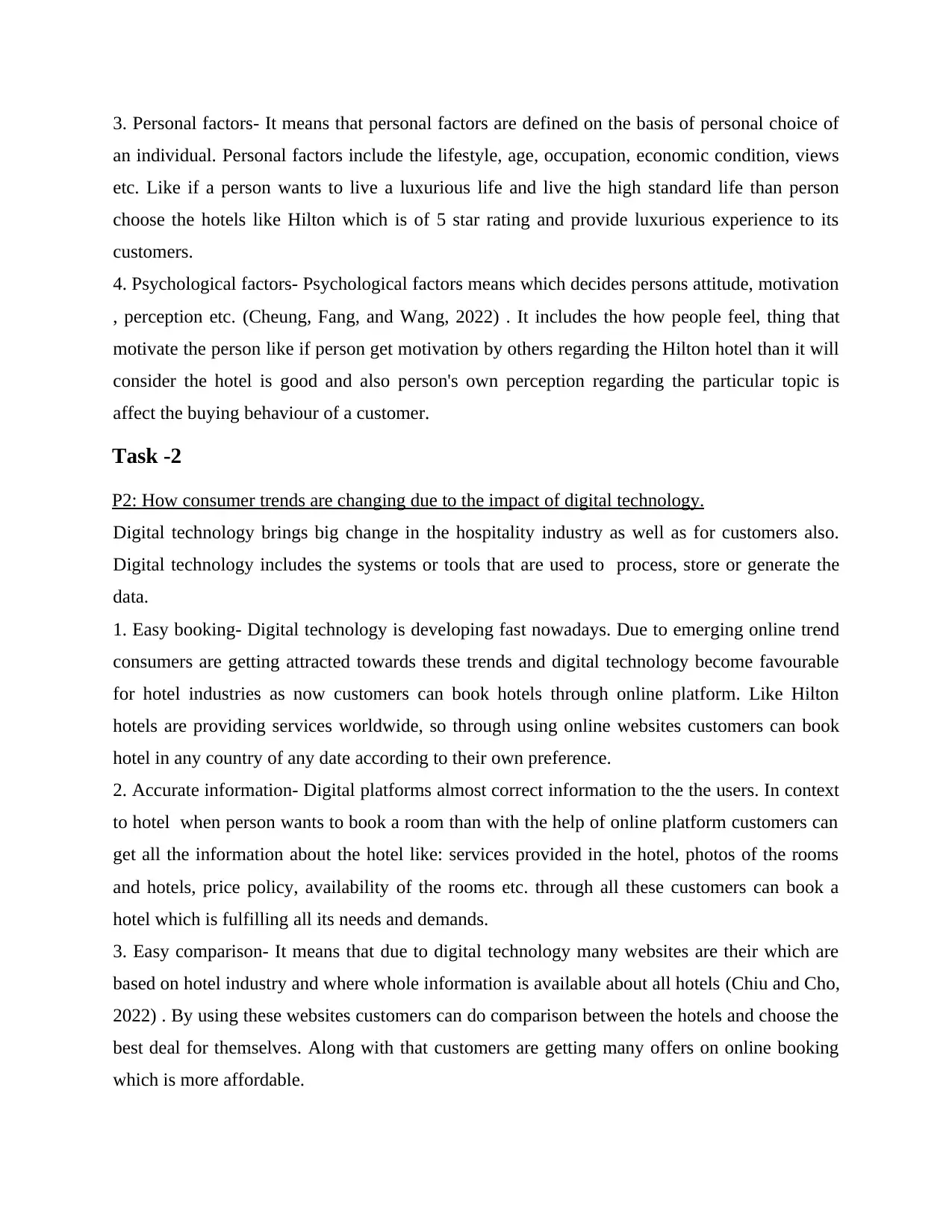
3. Personal factors- It means that personal factors are defined on the basis of personal choice of
an individual. Personal factors include the lifestyle, age, occupation, economic condition, views
etc. Like if a person wants to live a luxurious life and live the high standard life than person
choose the hotels like Hilton which is of 5 star rating and provide luxurious experience to its
customers.
4. Psychological factors- Psychological factors means which decides persons attitude, motivation
, perception etc. (Cheung, Fang, and Wang, 2022) . It includes the how people feel, thing that
motivate the person like if person get motivation by others regarding the Hilton hotel than it will
consider the hotel is good and also person's own perception regarding the particular topic is
affect the buying behaviour of a customer.
Task -2
P2: How consumer trends are changing due to the impact of digital technology.
Digital technology brings big change in the hospitality industry as well as for customers also.
Digital technology includes the systems or tools that are used to process, store or generate the
data.
1. Easy booking- Digital technology is developing fast nowadays. Due to emerging online trend
consumers are getting attracted towards these trends and digital technology become favourable
for hotel industries as now customers can book hotels through online platform. Like Hilton
hotels are providing services worldwide, so through using online websites customers can book
hotel in any country of any date according to their own preference.
2. Accurate information- Digital platforms almost correct information to the the users. In context
to hotel when person wants to book a room than with the help of online platform customers can
get all the information about the hotel like: services provided in the hotel, photos of the rooms
and hotels, price policy, availability of the rooms etc. through all these customers can book a
hotel which is fulfilling all its needs and demands.
3. Easy comparison- It means that due to digital technology many websites are their which are
based on hotel industry and where whole information is available about all hotels (Chiu and Cho,
2022) . By using these websites customers can do comparison between the hotels and choose the
best deal for themselves. Along with that customers are getting many offers on online booking
which is more affordable.
an individual. Personal factors include the lifestyle, age, occupation, economic condition, views
etc. Like if a person wants to live a luxurious life and live the high standard life than person
choose the hotels like Hilton which is of 5 star rating and provide luxurious experience to its
customers.
4. Psychological factors- Psychological factors means which decides persons attitude, motivation
, perception etc. (Cheung, Fang, and Wang, 2022) . It includes the how people feel, thing that
motivate the person like if person get motivation by others regarding the Hilton hotel than it will
consider the hotel is good and also person's own perception regarding the particular topic is
affect the buying behaviour of a customer.
Task -2
P2: How consumer trends are changing due to the impact of digital technology.
Digital technology brings big change in the hospitality industry as well as for customers also.
Digital technology includes the systems or tools that are used to process, store or generate the
data.
1. Easy booking- Digital technology is developing fast nowadays. Due to emerging online trend
consumers are getting attracted towards these trends and digital technology become favourable
for hotel industries as now customers can book hotels through online platform. Like Hilton
hotels are providing services worldwide, so through using online websites customers can book
hotel in any country of any date according to their own preference.
2. Accurate information- Digital platforms almost correct information to the the users. In context
to hotel when person wants to book a room than with the help of online platform customers can
get all the information about the hotel like: services provided in the hotel, photos of the rooms
and hotels, price policy, availability of the rooms etc. through all these customers can book a
hotel which is fulfilling all its needs and demands.
3. Easy comparison- It means that due to digital technology many websites are their which are
based on hotel industry and where whole information is available about all hotels (Chiu and Cho,
2022) . By using these websites customers can do comparison between the hotels and choose the
best deal for themselves. Along with that customers are getting many offers on online booking
which is more affordable.
Secure Best Marks with AI Grader
Need help grading? Try our AI Grader for instant feedback on your assignments.
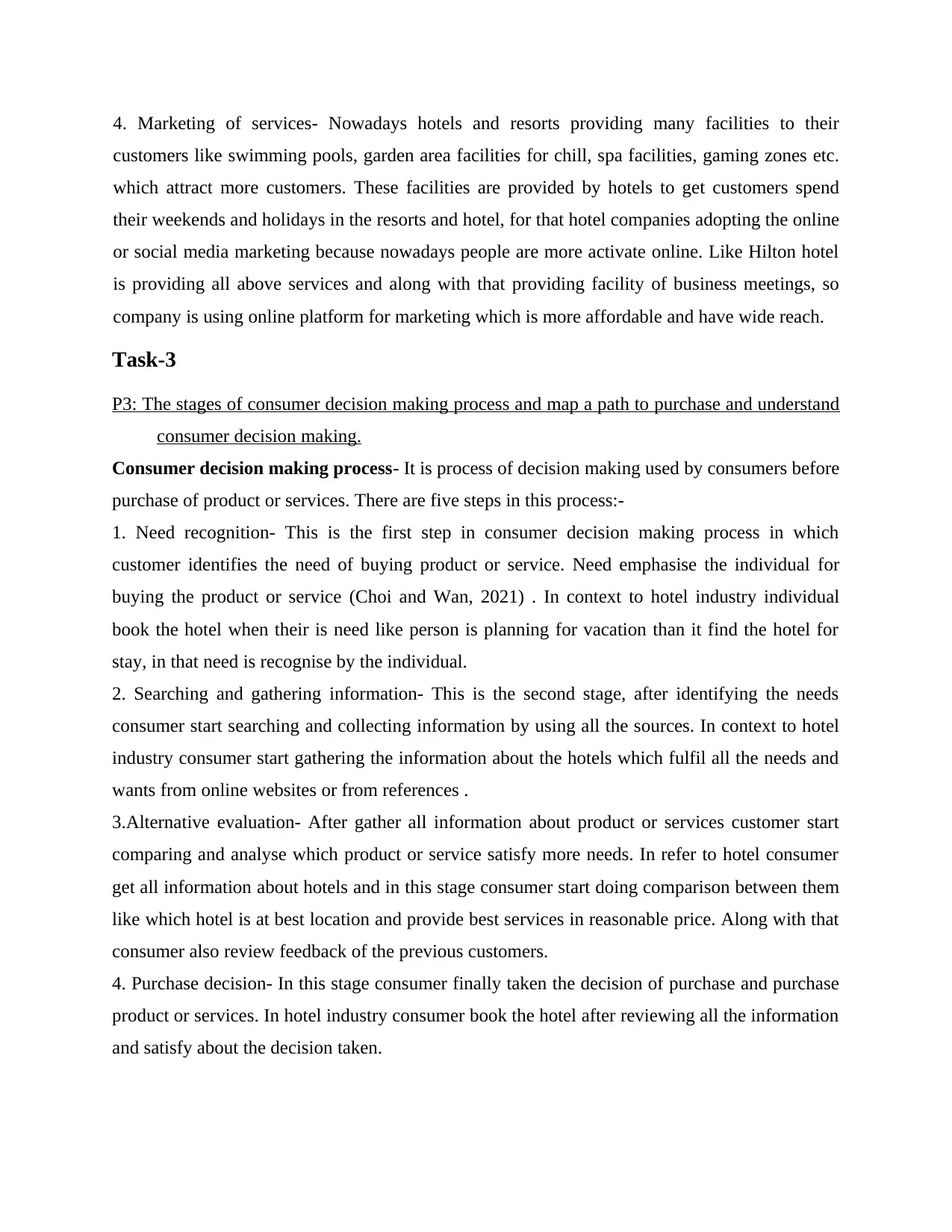
4. Marketing of services- Nowadays hotels and resorts providing many facilities to their
customers like swimming pools, garden area facilities for chill, spa facilities, gaming zones etc.
which attract more customers. These facilities are provided by hotels to get customers spend
their weekends and holidays in the resorts and hotel, for that hotel companies adopting the online
or social media marketing because nowadays people are more activate online. Like Hilton hotel
is providing all above services and along with that providing facility of business meetings, so
company is using online platform for marketing which is more affordable and have wide reach.
Task-3
P3: The stages of consumer decision making process and map a path to purchase and understand
consumer decision making.
Consumer decision making process- It is process of decision making used by consumers before
purchase of product or services. There are five steps in this process:-
1. Need recognition- This is the first step in consumer decision making process in which
customer identifies the need of buying product or service. Need emphasise the individual for
buying the product or service (Choi and Wan, 2021) . In context to hotel industry individual
book the hotel when their is need like person is planning for vacation than it find the hotel for
stay, in that need is recognise by the individual.
2. Searching and gathering information- This is the second stage, after identifying the needs
consumer start searching and collecting information by using all the sources. In context to hotel
industry consumer start gathering the information about the hotels which fulfil all the needs and
wants from online websites or from references .
3.Alternative evaluation- After gather all information about product or services customer start
comparing and analyse which product or service satisfy more needs. In refer to hotel consumer
get all information about hotels and in this stage consumer start doing comparison between them
like which hotel is at best location and provide best services in reasonable price. Along with that
consumer also review feedback of the previous customers.
4. Purchase decision- In this stage consumer finally taken the decision of purchase and purchase
product or services. In hotel industry consumer book the hotel after reviewing all the information
and satisfy about the decision taken.
customers like swimming pools, garden area facilities for chill, spa facilities, gaming zones etc.
which attract more customers. These facilities are provided by hotels to get customers spend
their weekends and holidays in the resorts and hotel, for that hotel companies adopting the online
or social media marketing because nowadays people are more activate online. Like Hilton hotel
is providing all above services and along with that providing facility of business meetings, so
company is using online platform for marketing which is more affordable and have wide reach.
Task-3
P3: The stages of consumer decision making process and map a path to purchase and understand
consumer decision making.
Consumer decision making process- It is process of decision making used by consumers before
purchase of product or services. There are five steps in this process:-
1. Need recognition- This is the first step in consumer decision making process in which
customer identifies the need of buying product or service. Need emphasise the individual for
buying the product or service (Choi and Wan, 2021) . In context to hotel industry individual
book the hotel when their is need like person is planning for vacation than it find the hotel for
stay, in that need is recognise by the individual.
2. Searching and gathering information- This is the second stage, after identifying the needs
consumer start searching and collecting information by using all the sources. In context to hotel
industry consumer start gathering the information about the hotels which fulfil all the needs and
wants from online websites or from references .
3.Alternative evaluation- After gather all information about product or services customer start
comparing and analyse which product or service satisfy more needs. In refer to hotel consumer
get all information about hotels and in this stage consumer start doing comparison between them
like which hotel is at best location and provide best services in reasonable price. Along with that
consumer also review feedback of the previous customers.
4. Purchase decision- In this stage consumer finally taken the decision of purchase and purchase
product or services. In hotel industry consumer book the hotel after reviewing all the information
and satisfy about the decision taken.
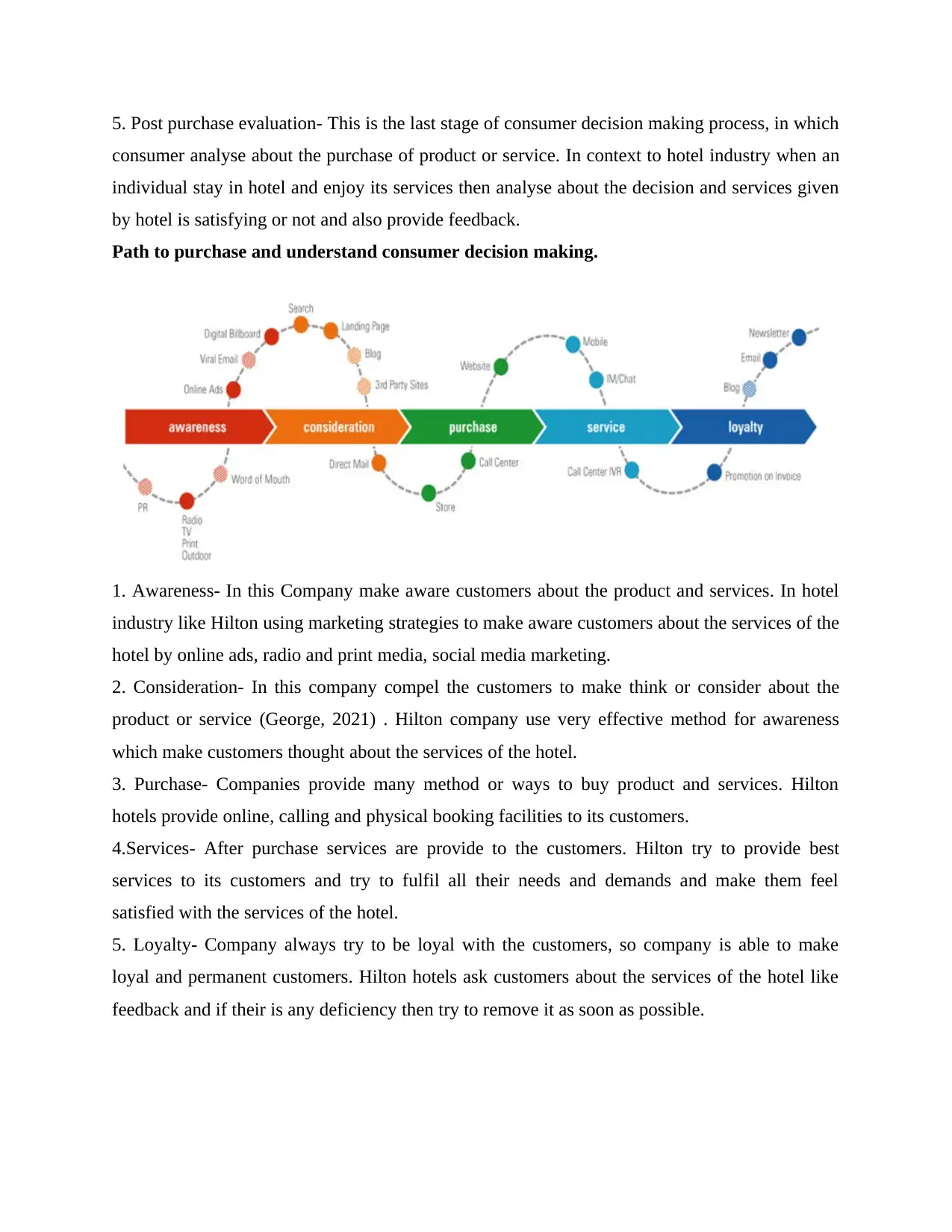
5. Post purchase evaluation- This is the last stage of consumer decision making process, in which
consumer analyse about the purchase of product or service. In context to hotel industry when an
individual stay in hotel and enjoy its services then analyse about the decision and services given
by hotel is satisfying or not and also provide feedback.
Path to purchase and understand consumer decision making.
1. Awareness- In this Company make aware customers about the product and services. In hotel
industry like Hilton using marketing strategies to make aware customers about the services of the
hotel by online ads, radio and print media, social media marketing.
2. Consideration- In this company compel the customers to make think or consider about the
product or service (George, 2021) . Hilton company use very effective method for awareness
which make customers thought about the services of the hotel.
3. Purchase- Companies provide many method or ways to buy product and services. Hilton
hotels provide online, calling and physical booking facilities to its customers.
4.Services- After purchase services are provide to the customers. Hilton try to provide best
services to its customers and try to fulfil all their needs and demands and make them feel
satisfied with the services of the hotel.
5. Loyalty- Company always try to be loyal with the customers, so company is able to make
loyal and permanent customers. Hilton hotels ask customers about the services of the hotel like
feedback and if their is any deficiency then try to remove it as soon as possible.
consumer analyse about the purchase of product or service. In context to hotel industry when an
individual stay in hotel and enjoy its services then analyse about the decision and services given
by hotel is satisfying or not and also provide feedback.
Path to purchase and understand consumer decision making.
1. Awareness- In this Company make aware customers about the product and services. In hotel
industry like Hilton using marketing strategies to make aware customers about the services of the
hotel by online ads, radio and print media, social media marketing.
2. Consideration- In this company compel the customers to make think or consider about the
product or service (George, 2021) . Hilton company use very effective method for awareness
which make customers thought about the services of the hotel.
3. Purchase- Companies provide many method or ways to buy product and services. Hilton
hotels provide online, calling and physical booking facilities to its customers.
4.Services- After purchase services are provide to the customers. Hilton try to provide best
services to its customers and try to fulfil all their needs and demands and make them feel
satisfied with the services of the hotel.
5. Loyalty- Company always try to be loyal with the customers, so company is able to make
loyal and permanent customers. Hilton hotels ask customers about the services of the hotel like
feedback and if their is any deficiency then try to remove it as soon as possible.
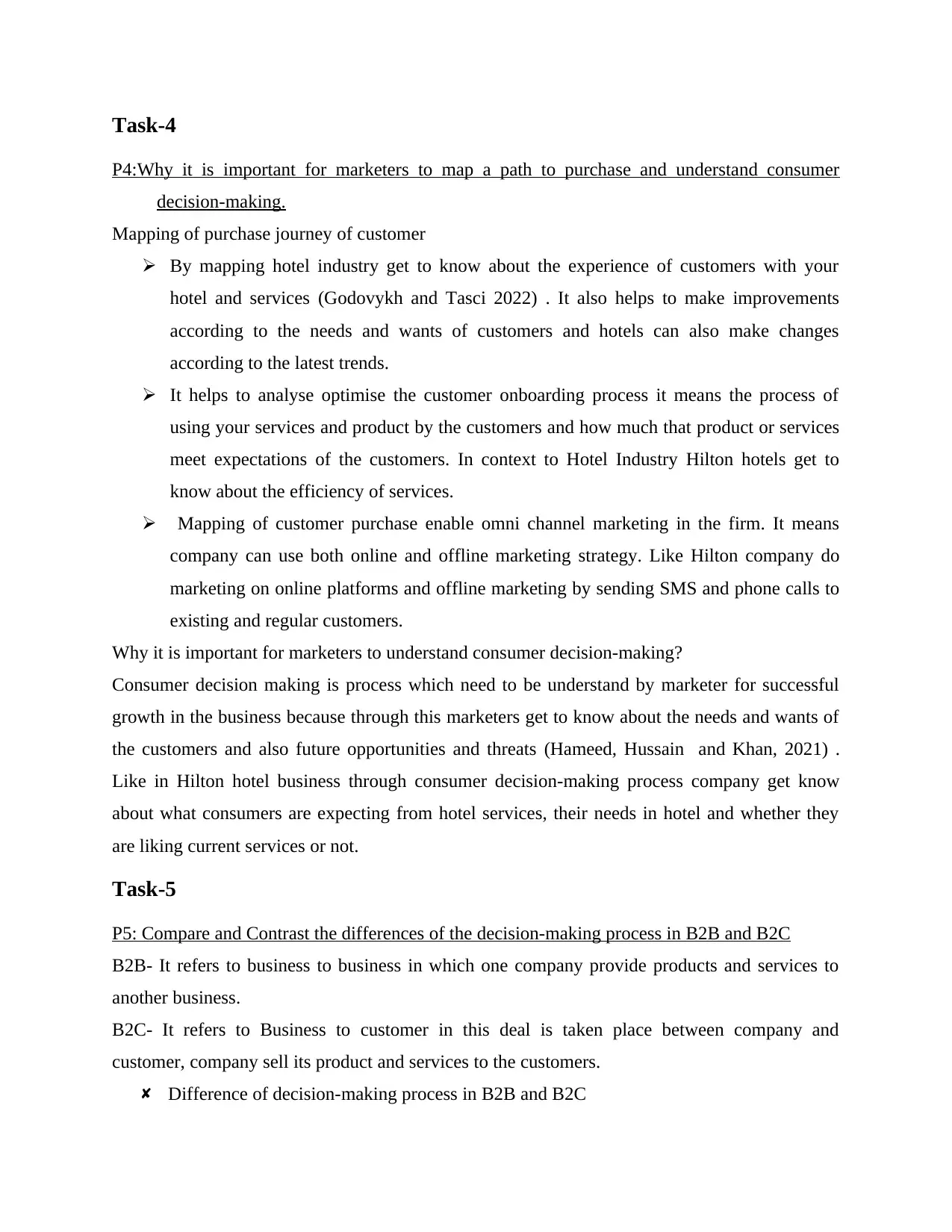
Task-4
P4:Why it is important for marketers to map a path to purchase and understand consumer
decision-making.
Mapping of purchase journey of customer
By mapping hotel industry get to know about the experience of customers with your
hotel and services (Godovykh and Tasci 2022) . It also helps to make improvements
according to the needs and wants of customers and hotels can also make changes
according to the latest trends.
It helps to analyse optimise the customer onboarding process it means the process of
using your services and product by the customers and how much that product or services
meet expectations of the customers. In context to Hotel Industry Hilton hotels get to
know about the efficiency of services.
Mapping of customer purchase enable omni channel marketing in the firm. It means
company can use both online and offline marketing strategy. Like Hilton company do
marketing on online platforms and offline marketing by sending SMS and phone calls to
existing and regular customers.
Why it is important for marketers to understand consumer decision-making?
Consumer decision making is process which need to be understand by marketer for successful
growth in the business because through this marketers get to know about the needs and wants of
the customers and also future opportunities and threats (Hameed, Hussain and Khan, 2021) .
Like in Hilton hotel business through consumer decision-making process company get know
about what consumers are expecting from hotel services, their needs in hotel and whether they
are liking current services or not.
Task-5
P5: Compare and Contrast the differences of the decision-making process in B2B and B2C
B2B- It refers to business to business in which one company provide products and services to
another business.
B2C- It refers to Business to customer in this deal is taken place between company and
customer, company sell its product and services to the customers.
Difference of decision-making process in B2B and B2C
P4:Why it is important for marketers to map a path to purchase and understand consumer
decision-making.
Mapping of purchase journey of customer
By mapping hotel industry get to know about the experience of customers with your
hotel and services (Godovykh and Tasci 2022) . It also helps to make improvements
according to the needs and wants of customers and hotels can also make changes
according to the latest trends.
It helps to analyse optimise the customer onboarding process it means the process of
using your services and product by the customers and how much that product or services
meet expectations of the customers. In context to Hotel Industry Hilton hotels get to
know about the efficiency of services.
Mapping of customer purchase enable omni channel marketing in the firm. It means
company can use both online and offline marketing strategy. Like Hilton company do
marketing on online platforms and offline marketing by sending SMS and phone calls to
existing and regular customers.
Why it is important for marketers to understand consumer decision-making?
Consumer decision making is process which need to be understand by marketer for successful
growth in the business because through this marketers get to know about the needs and wants of
the customers and also future opportunities and threats (Hameed, Hussain and Khan, 2021) .
Like in Hilton hotel business through consumer decision-making process company get know
about what consumers are expecting from hotel services, their needs in hotel and whether they
are liking current services or not.
Task-5
P5: Compare and Contrast the differences of the decision-making process in B2B and B2C
B2B- It refers to business to business in which one company provide products and services to
another business.
B2C- It refers to Business to customer in this deal is taken place between company and
customer, company sell its product and services to the customers.
Difference of decision-making process in B2B and B2C
Paraphrase This Document
Need a fresh take? Get an instant paraphrase of this document with our AI Paraphraser
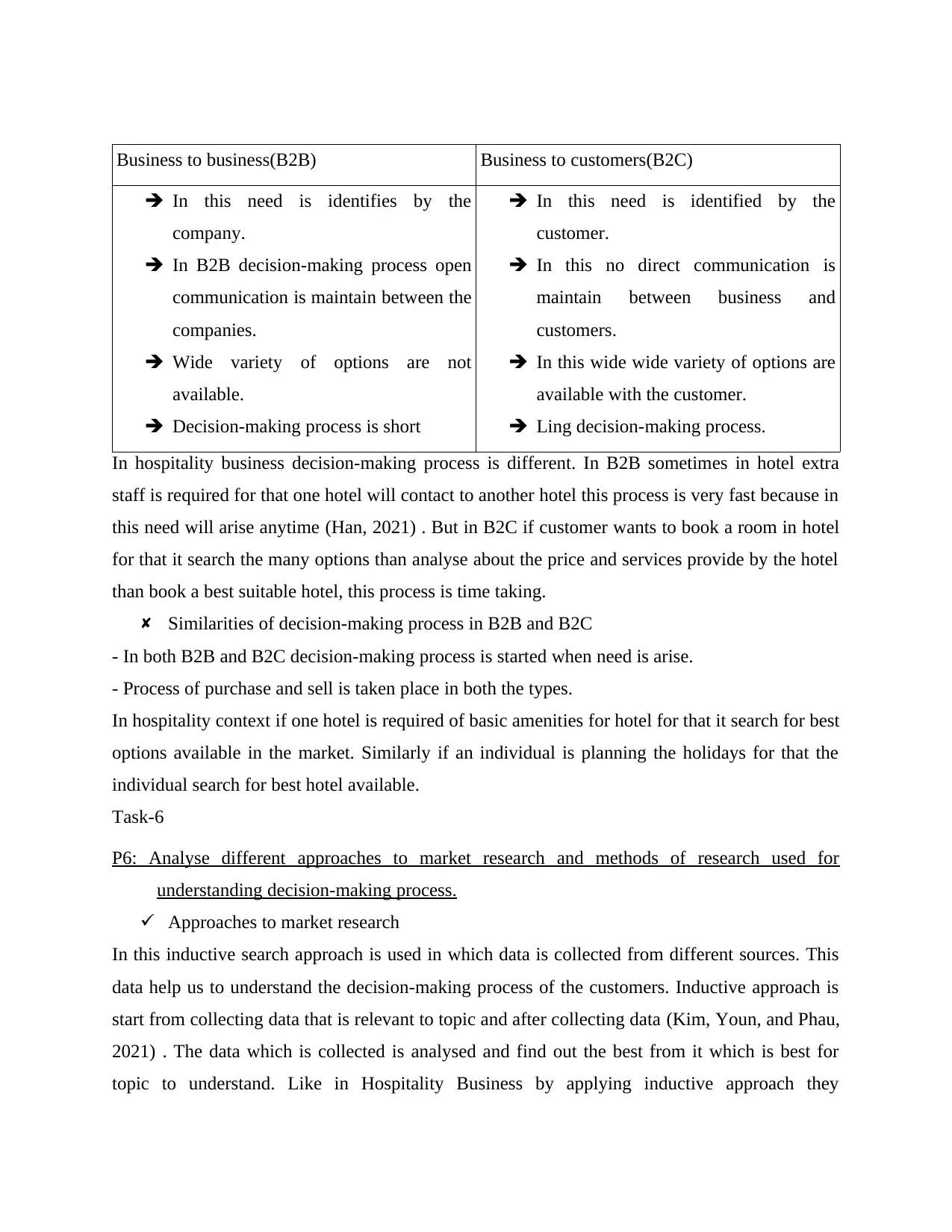
Business to business(B2B) Business to customers(B2C)
In this need is identifies by the
company.
In B2B decision-making process open
communication is maintain between the
companies.
Wide variety of options are not
available.
Decision-making process is short
In this need is identified by the
customer.
In this no direct communication is
maintain between business and
customers.
In this wide wide variety of options are
available with the customer.
Ling decision-making process.
In hospitality business decision-making process is different. In B2B sometimes in hotel extra
staff is required for that one hotel will contact to another hotel this process is very fast because in
this need will arise anytime (Han, 2021) . But in B2C if customer wants to book a room in hotel
for that it search the many options than analyse about the price and services provide by the hotel
than book a best suitable hotel, this process is time taking.
Similarities of decision-making process in B2B and B2C
- In both B2B and B2C decision-making process is started when need is arise.
- Process of purchase and sell is taken place in both the types.
In hospitality context if one hotel is required of basic amenities for hotel for that it search for best
options available in the market. Similarly if an individual is planning the holidays for that the
individual search for best hotel available.
Task-6
P6: Analyse different approaches to market research and methods of research used for
understanding decision-making process.
Approaches to market research
In this inductive search approach is used in which data is collected from different sources. This
data help us to understand the decision-making process of the customers. Inductive approach is
start from collecting data that is relevant to topic and after collecting data (Kim, Youn, and Phau,
2021) . The data which is collected is analysed and find out the best from it which is best for
topic to understand. Like in Hospitality Business by applying inductive approach they
In this need is identifies by the
company.
In B2B decision-making process open
communication is maintain between the
companies.
Wide variety of options are not
available.
Decision-making process is short
In this need is identified by the
customer.
In this no direct communication is
maintain between business and
customers.
In this wide wide variety of options are
available with the customer.
Ling decision-making process.
In hospitality business decision-making process is different. In B2B sometimes in hotel extra
staff is required for that one hotel will contact to another hotel this process is very fast because in
this need will arise anytime (Han, 2021) . But in B2C if customer wants to book a room in hotel
for that it search the many options than analyse about the price and services provide by the hotel
than book a best suitable hotel, this process is time taking.
Similarities of decision-making process in B2B and B2C
- In both B2B and B2C decision-making process is started when need is arise.
- Process of purchase and sell is taken place in both the types.
In hospitality context if one hotel is required of basic amenities for hotel for that it search for best
options available in the market. Similarly if an individual is planning the holidays for that the
individual search for best hotel available.
Task-6
P6: Analyse different approaches to market research and methods of research used for
understanding decision-making process.
Approaches to market research
In this inductive search approach is used in which data is collected from different sources. This
data help us to understand the decision-making process of the customers. Inductive approach is
start from collecting data that is relevant to topic and after collecting data (Kim, Youn, and Phau,
2021) . The data which is collected is analysed and find out the best from it which is best for
topic to understand. Like in Hospitality Business by applying inductive approach they
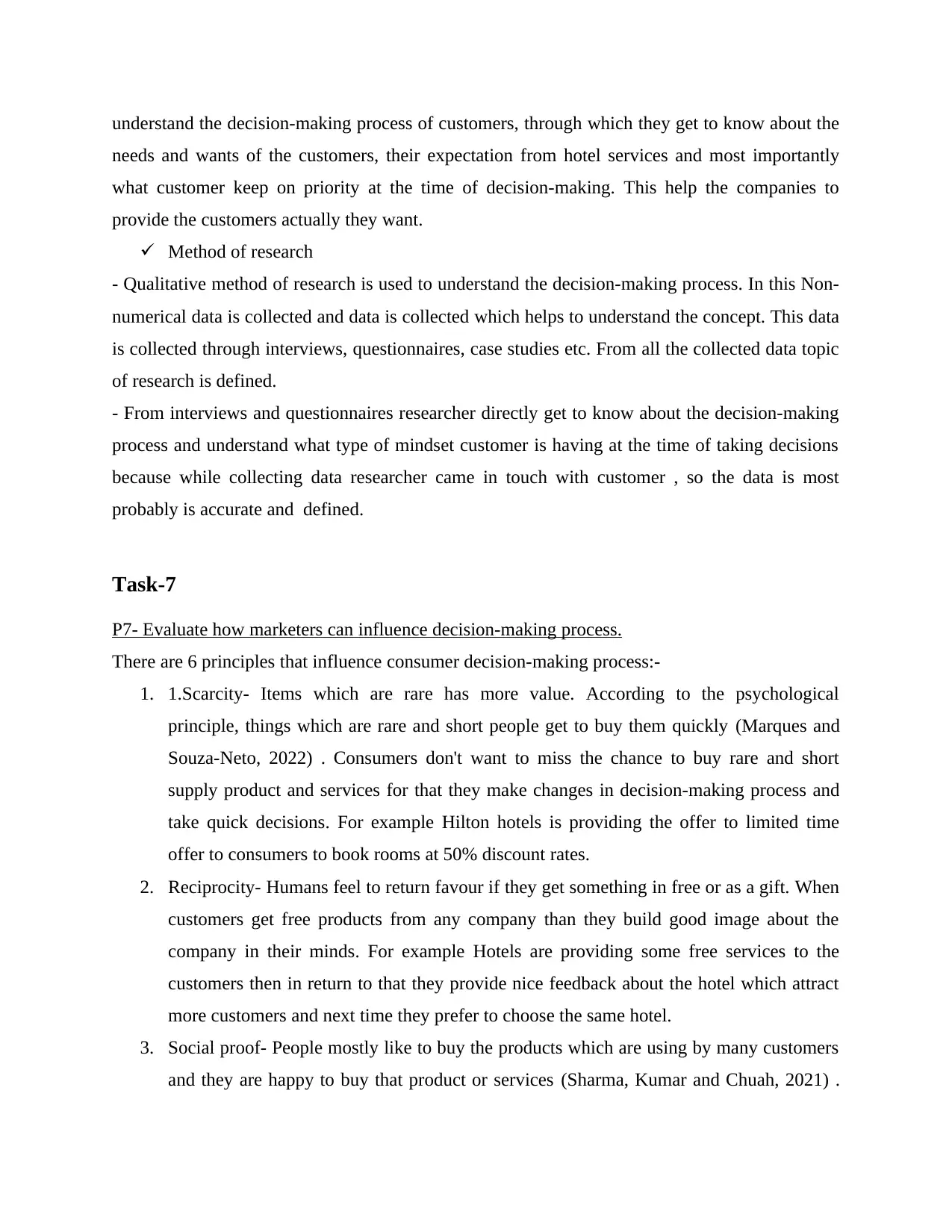
understand the decision-making process of customers, through which they get to know about the
needs and wants of the customers, their expectation from hotel services and most importantly
what customer keep on priority at the time of decision-making. This help the companies to
provide the customers actually they want.
Method of research
- Qualitative method of research is used to understand the decision-making process. In this Non-
numerical data is collected and data is collected which helps to understand the concept. This data
is collected through interviews, questionnaires, case studies etc. From all the collected data topic
of research is defined.
- From interviews and questionnaires researcher directly get to know about the decision-making
process and understand what type of mindset customer is having at the time of taking decisions
because while collecting data researcher came in touch with customer , so the data is most
probably is accurate and defined.
Task-7
P7- Evaluate how marketers can influence decision-making process.
There are 6 principles that influence consumer decision-making process:-
1. 1.Scarcity- Items which are rare has more value. According to the psychological
principle, things which are rare and short people get to buy them quickly (Marques and
Souza-Neto, 2022) . Consumers don't want to miss the chance to buy rare and short
supply product and services for that they make changes in decision-making process and
take quick decisions. For example Hilton hotels is providing the offer to limited time
offer to consumers to book rooms at 50% discount rates.
2. Reciprocity- Humans feel to return favour if they get something in free or as a gift. When
customers get free products from any company than they build good image about the
company in their minds. For example Hotels are providing some free services to the
customers then in return to that they provide nice feedback about the hotel which attract
more customers and next time they prefer to choose the same hotel.
3. Social proof- People mostly like to buy the products which are using by many customers
and they are happy to buy that product or services (Sharma, Kumar and Chuah, 2021) .
needs and wants of the customers, their expectation from hotel services and most importantly
what customer keep on priority at the time of decision-making. This help the companies to
provide the customers actually they want.
Method of research
- Qualitative method of research is used to understand the decision-making process. In this Non-
numerical data is collected and data is collected which helps to understand the concept. This data
is collected through interviews, questionnaires, case studies etc. From all the collected data topic
of research is defined.
- From interviews and questionnaires researcher directly get to know about the decision-making
process and understand what type of mindset customer is having at the time of taking decisions
because while collecting data researcher came in touch with customer , so the data is most
probably is accurate and defined.
Task-7
P7- Evaluate how marketers can influence decision-making process.
There are 6 principles that influence consumer decision-making process:-
1. 1.Scarcity- Items which are rare has more value. According to the psychological
principle, things which are rare and short people get to buy them quickly (Marques and
Souza-Neto, 2022) . Consumers don't want to miss the chance to buy rare and short
supply product and services for that they make changes in decision-making process and
take quick decisions. For example Hilton hotels is providing the offer to limited time
offer to consumers to book rooms at 50% discount rates.
2. Reciprocity- Humans feel to return favour if they get something in free or as a gift. When
customers get free products from any company than they build good image about the
company in their minds. For example Hotels are providing some free services to the
customers then in return to that they provide nice feedback about the hotel which attract
more customers and next time they prefer to choose the same hotel.
3. Social proof- People mostly like to buy the products which are using by many customers
and they are happy to buy that product or services (Sharma, Kumar and Chuah, 2021) .
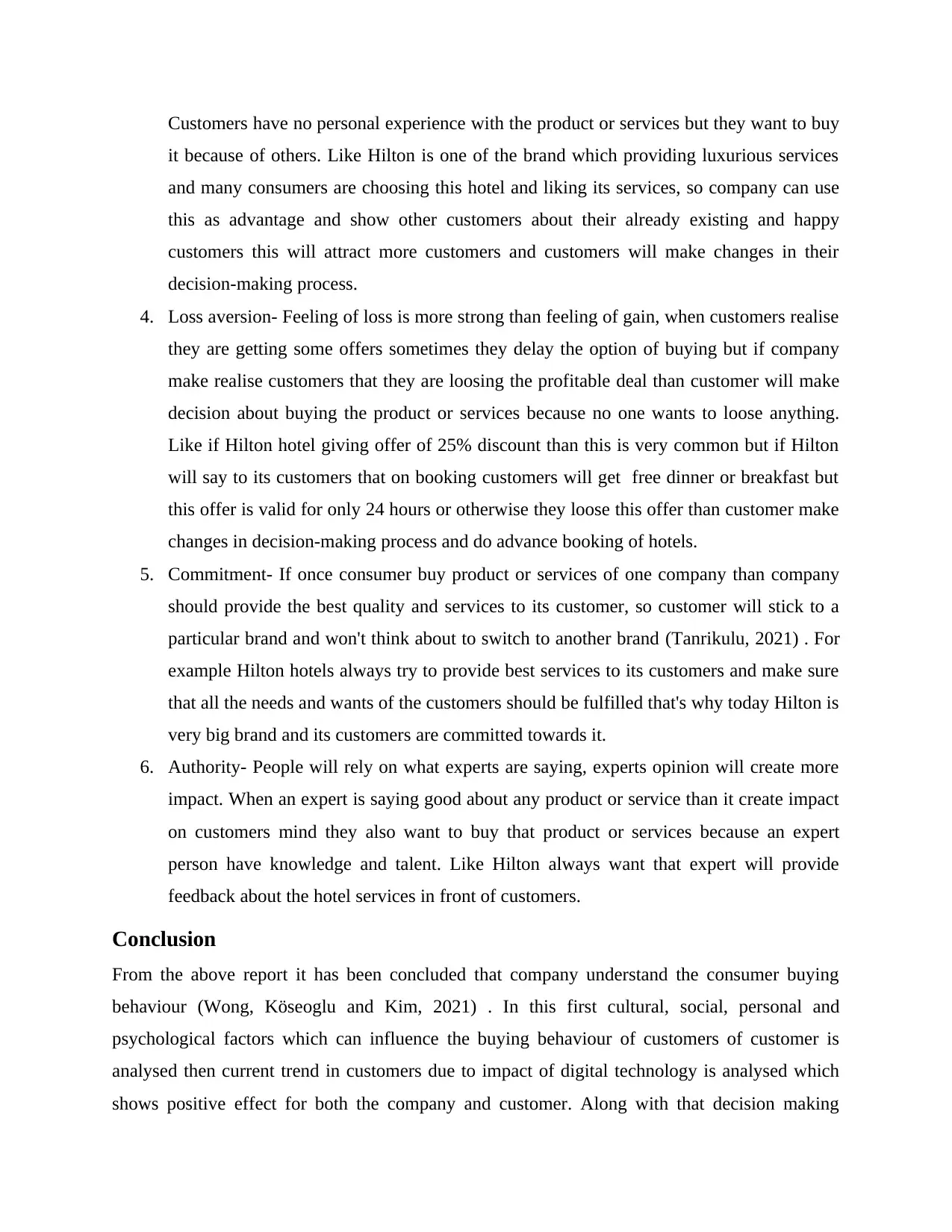
Customers have no personal experience with the product or services but they want to buy
it because of others. Like Hilton is one of the brand which providing luxurious services
and many consumers are choosing this hotel and liking its services, so company can use
this as advantage and show other customers about their already existing and happy
customers this will attract more customers and customers will make changes in their
decision-making process.
4. Loss aversion- Feeling of loss is more strong than feeling of gain, when customers realise
they are getting some offers sometimes they delay the option of buying but if company
make realise customers that they are loosing the profitable deal than customer will make
decision about buying the product or services because no one wants to loose anything.
Like if Hilton hotel giving offer of 25% discount than this is very common but if Hilton
will say to its customers that on booking customers will get free dinner or breakfast but
this offer is valid for only 24 hours or otherwise they loose this offer than customer make
changes in decision-making process and do advance booking of hotels.
5. Commitment- If once consumer buy product or services of one company than company
should provide the best quality and services to its customer, so customer will stick to a
particular brand and won't think about to switch to another brand (Tanrikulu, 2021) . For
example Hilton hotels always try to provide best services to its customers and make sure
that all the needs and wants of the customers should be fulfilled that's why today Hilton is
very big brand and its customers are committed towards it.
6. Authority- People will rely on what experts are saying, experts opinion will create more
impact. When an expert is saying good about any product or service than it create impact
on customers mind they also want to buy that product or services because an expert
person have knowledge and talent. Like Hilton always want that expert will provide
feedback about the hotel services in front of customers.
Conclusion
From the above report it has been concluded that company understand the consumer buying
behaviour (Wong, Köseoglu and Kim, 2021) . In this first cultural, social, personal and
psychological factors which can influence the buying behaviour of customers of customer is
analysed then current trend in customers due to impact of digital technology is analysed which
shows positive effect for both the company and customer. Along with that decision making
it because of others. Like Hilton is one of the brand which providing luxurious services
and many consumers are choosing this hotel and liking its services, so company can use
this as advantage and show other customers about their already existing and happy
customers this will attract more customers and customers will make changes in their
decision-making process.
4. Loss aversion- Feeling of loss is more strong than feeling of gain, when customers realise
they are getting some offers sometimes they delay the option of buying but if company
make realise customers that they are loosing the profitable deal than customer will make
decision about buying the product or services because no one wants to loose anything.
Like if Hilton hotel giving offer of 25% discount than this is very common but if Hilton
will say to its customers that on booking customers will get free dinner or breakfast but
this offer is valid for only 24 hours or otherwise they loose this offer than customer make
changes in decision-making process and do advance booking of hotels.
5. Commitment- If once consumer buy product or services of one company than company
should provide the best quality and services to its customer, so customer will stick to a
particular brand and won't think about to switch to another brand (Tanrikulu, 2021) . For
example Hilton hotels always try to provide best services to its customers and make sure
that all the needs and wants of the customers should be fulfilled that's why today Hilton is
very big brand and its customers are committed towards it.
6. Authority- People will rely on what experts are saying, experts opinion will create more
impact. When an expert is saying good about any product or service than it create impact
on customers mind they also want to buy that product or services because an expert
person have knowledge and talent. Like Hilton always want that expert will provide
feedback about the hotel services in front of customers.
Conclusion
From the above report it has been concluded that company understand the consumer buying
behaviour (Wong, Köseoglu and Kim, 2021) . In this first cultural, social, personal and
psychological factors which can influence the buying behaviour of customers of customer is
analysed then current trend in customers due to impact of digital technology is analysed which
shows positive effect for both the company and customer. Along with that decision making
Secure Best Marks with AI Grader
Need help grading? Try our AI Grader for instant feedback on your assignments.
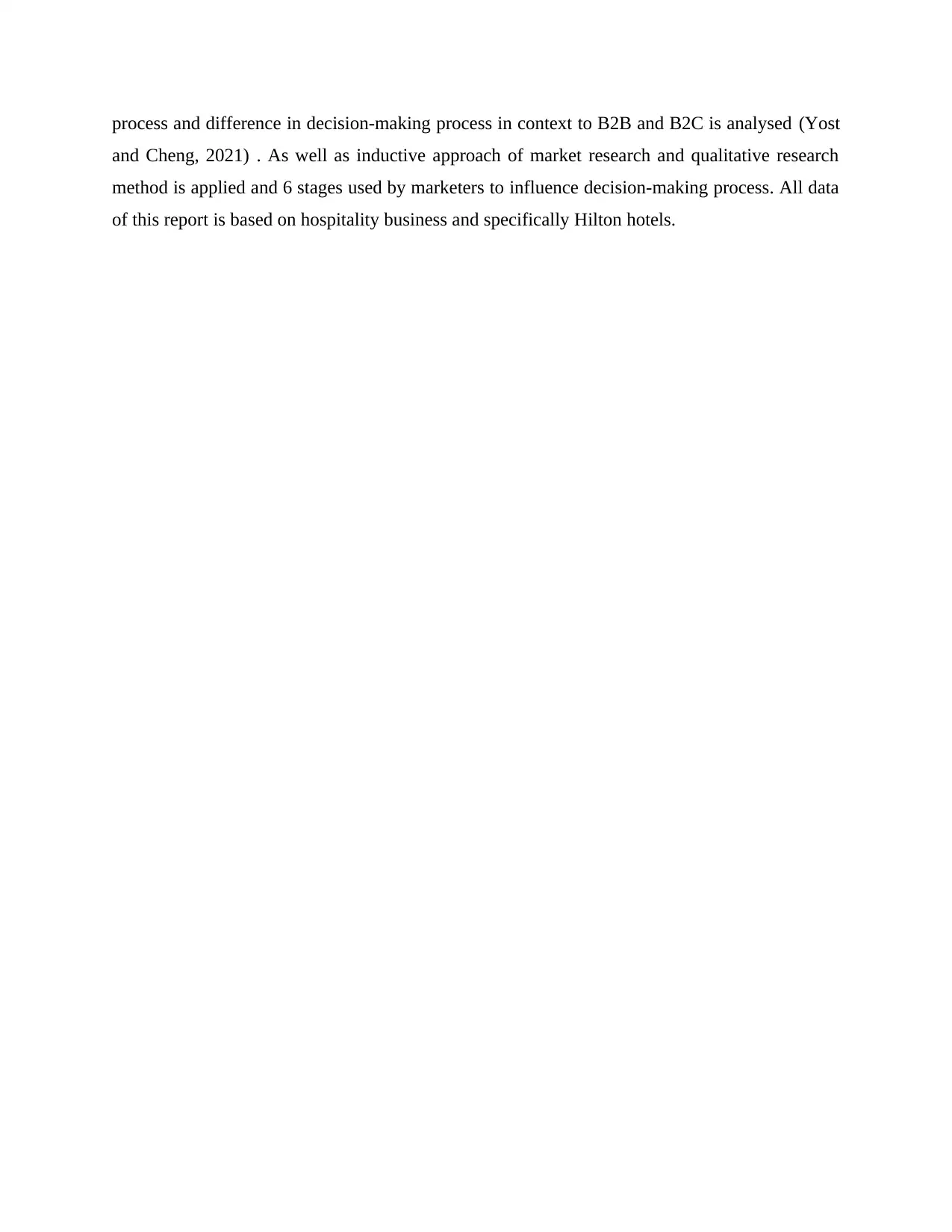
process and difference in decision-making process in context to B2B and B2C is analysed (Yost
and Cheng, 2021) . As well as inductive approach of market research and qualitative research
method is applied and 6 stages used by marketers to influence decision-making process. All data
of this report is based on hospitality business and specifically Hilton hotels.
and Cheng, 2021) . As well as inductive approach of market research and qualitative research
method is applied and 6 stages used by marketers to influence decision-making process. All data
of this report is based on hospitality business and specifically Hilton hotels.
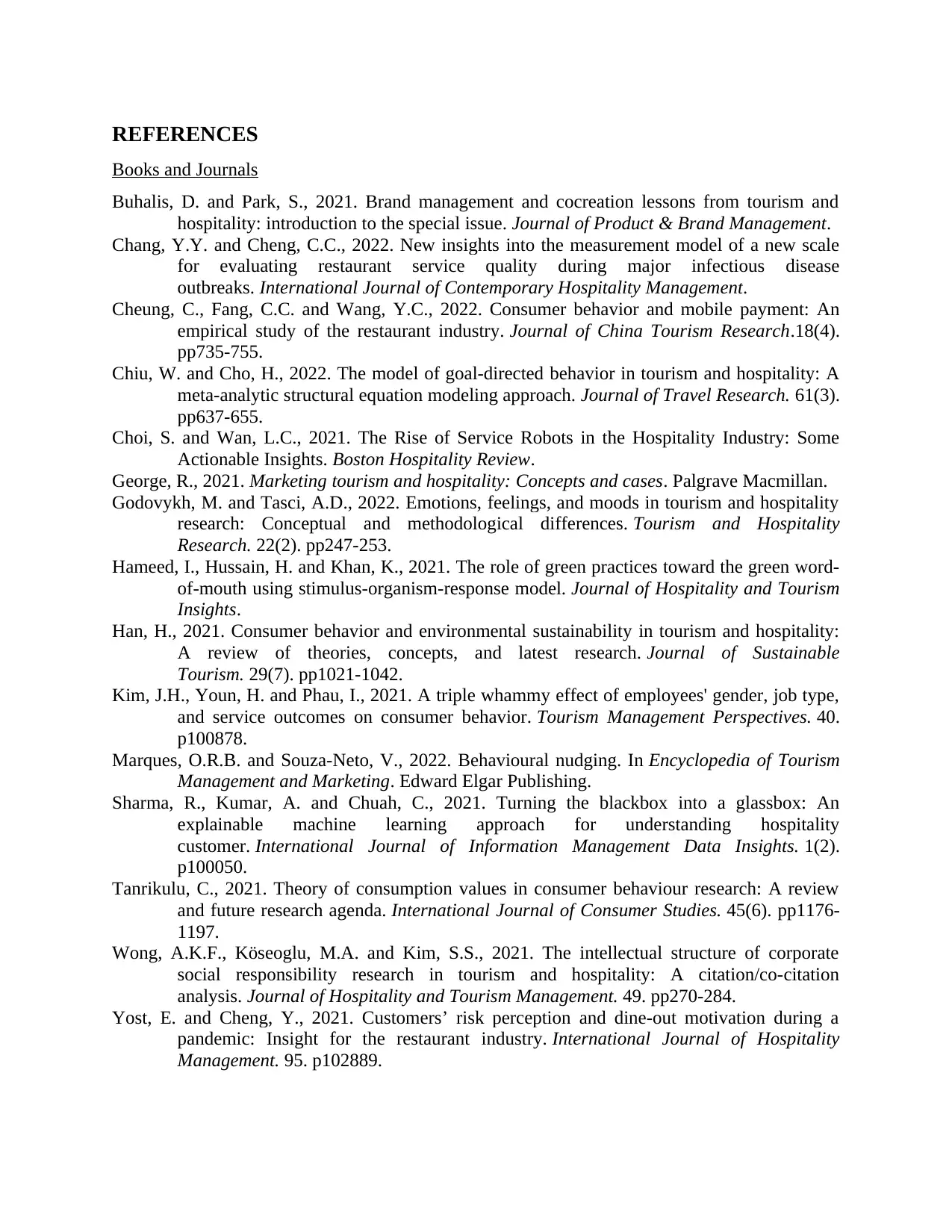
REFERENCES
Books and Journals
Buhalis, D. and Park, S., 2021. Brand management and cocreation lessons from tourism and
hospitality: introduction to the special issue. Journal of Product & Brand Management.
Chang, Y.Y. and Cheng, C.C., 2022. New insights into the measurement model of a new scale
for evaluating restaurant service quality during major infectious disease
outbreaks. International Journal of Contemporary Hospitality Management.
Cheung, C., Fang, C.C. and Wang, Y.C., 2022. Consumer behavior and mobile payment: An
empirical study of the restaurant industry. Journal of China Tourism Research.18(4).
pp735-755.
Chiu, W. and Cho, H., 2022. The model of goal-directed behavior in tourism and hospitality: A
meta-analytic structural equation modeling approach. Journal of Travel Research. 61(3).
pp637-655.
Choi, S. and Wan, L.C., 2021. The Rise of Service Robots in the Hospitality Industry: Some
Actionable Insights. Boston Hospitality Review.
George, R., 2021. Marketing tourism and hospitality: Concepts and cases. Palgrave Macmillan.
Godovykh, M. and Tasci, A.D., 2022. Emotions, feelings, and moods in tourism and hospitality
research: Conceptual and methodological differences. Tourism and Hospitality
Research. 22(2). pp247-253.
Hameed, I., Hussain, H. and Khan, K., 2021. The role of green practices toward the green word-
of-mouth using stimulus-organism-response model. Journal of Hospitality and Tourism
Insights.
Han, H., 2021. Consumer behavior and environmental sustainability in tourism and hospitality:
A review of theories, concepts, and latest research. Journal of Sustainable
Tourism. 29(7). pp1021-1042.
Kim, J.H., Youn, H. and Phau, I., 2021. A triple whammy effect of employees' gender, job type,
and service outcomes on consumer behavior. Tourism Management Perspectives. 40.
p100878.
Marques, O.R.B. and Souza-Neto, V., 2022. Behavioural nudging. In Encyclopedia of Tourism
Management and Marketing. Edward Elgar Publishing.
Sharma, R., Kumar, A. and Chuah, C., 2021. Turning the blackbox into a glassbox: An
explainable machine learning approach for understanding hospitality
customer. International Journal of Information Management Data Insights. 1(2).
p100050.
Tanrikulu, C., 2021. Theory of consumption values in consumer behaviour research: A review
and future research agenda. International Journal of Consumer Studies. 45(6). pp1176-
1197.
Wong, A.K.F., Köseoglu, M.A. and Kim, S.S., 2021. The intellectual structure of corporate
social responsibility research in tourism and hospitality: A citation/co-citation
analysis. Journal of Hospitality and Tourism Management. 49. pp270-284.
Yost, E. and Cheng, Y., 2021. Customers’ risk perception and dine-out motivation during a
pandemic: Insight for the restaurant industry. International Journal of Hospitality
Management. 95. p102889.
Books and Journals
Buhalis, D. and Park, S., 2021. Brand management and cocreation lessons from tourism and
hospitality: introduction to the special issue. Journal of Product & Brand Management.
Chang, Y.Y. and Cheng, C.C., 2022. New insights into the measurement model of a new scale
for evaluating restaurant service quality during major infectious disease
outbreaks. International Journal of Contemporary Hospitality Management.
Cheung, C., Fang, C.C. and Wang, Y.C., 2022. Consumer behavior and mobile payment: An
empirical study of the restaurant industry. Journal of China Tourism Research.18(4).
pp735-755.
Chiu, W. and Cho, H., 2022. The model of goal-directed behavior in tourism and hospitality: A
meta-analytic structural equation modeling approach. Journal of Travel Research. 61(3).
pp637-655.
Choi, S. and Wan, L.C., 2021. The Rise of Service Robots in the Hospitality Industry: Some
Actionable Insights. Boston Hospitality Review.
George, R., 2021. Marketing tourism and hospitality: Concepts and cases. Palgrave Macmillan.
Godovykh, M. and Tasci, A.D., 2022. Emotions, feelings, and moods in tourism and hospitality
research: Conceptual and methodological differences. Tourism and Hospitality
Research. 22(2). pp247-253.
Hameed, I., Hussain, H. and Khan, K., 2021. The role of green practices toward the green word-
of-mouth using stimulus-organism-response model. Journal of Hospitality and Tourism
Insights.
Han, H., 2021. Consumer behavior and environmental sustainability in tourism and hospitality:
A review of theories, concepts, and latest research. Journal of Sustainable
Tourism. 29(7). pp1021-1042.
Kim, J.H., Youn, H. and Phau, I., 2021. A triple whammy effect of employees' gender, job type,
and service outcomes on consumer behavior. Tourism Management Perspectives. 40.
p100878.
Marques, O.R.B. and Souza-Neto, V., 2022. Behavioural nudging. In Encyclopedia of Tourism
Management and Marketing. Edward Elgar Publishing.
Sharma, R., Kumar, A. and Chuah, C., 2021. Turning the blackbox into a glassbox: An
explainable machine learning approach for understanding hospitality
customer. International Journal of Information Management Data Insights. 1(2).
p100050.
Tanrikulu, C., 2021. Theory of consumption values in consumer behaviour research: A review
and future research agenda. International Journal of Consumer Studies. 45(6). pp1176-
1197.
Wong, A.K.F., Köseoglu, M.A. and Kim, S.S., 2021. The intellectual structure of corporate
social responsibility research in tourism and hospitality: A citation/co-citation
analysis. Journal of Hospitality and Tourism Management. 49. pp270-284.
Yost, E. and Cheng, Y., 2021. Customers’ risk perception and dine-out motivation during a
pandemic: Insight for the restaurant industry. International Journal of Hospitality
Management. 95. p102889.

1 out of 13
Related Documents
Your All-in-One AI-Powered Toolkit for Academic Success.
+13062052269
info@desklib.com
Available 24*7 on WhatsApp / Email
![[object Object]](/_next/static/media/star-bottom.7253800d.svg)
Unlock your academic potential
© 2024 | Zucol Services PVT LTD | All rights reserved.



